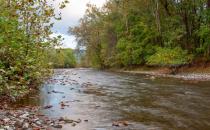U.S. Forest Service considers rule change to speed up oil, gas drilling on national forests
The U.S. Forest Service has given advance notice that it wants to revise its regulations for oil and gas drilling on national forest land. The proposed rulemaking would “streamline” the Forest Service’s environmental review and permitting process – a euphemism for limiting public involvement and making it easier to dismiss impacts to water quality, rare habitats, scenery, and recreation. The Forest Service wants to hand over the reins to the Bureau of Land Management (BLM), which has stated it wants to get more of our public lands into the hands of the oil and gas industry faster.
On behalf of Alliance for the Shenandoah Valley, The Clinch Coalition, and Virginia Wilderness Committee, SELC recently submitted comments opposing any rule changes that would expedite or expand oil and gas drilling on our national forests.
Encouraging more oil and gas development in national forests is an especially bad idea in the Southern Appalachian Mountains. Impacts from industrial fracking and other extractive activities would be out of place in our forests, which provide drinking water to millions and are visited by more than 11 million people annually to hunt, fish, camp and hike.
Spanning nearly five million acres from Virginia to Alabama, our Southern Appalachian national forests are among some of the most visited public lands in the region,” said Sam Evans, leader of SELC’s National Forests and Parks Program. “These forests give the public access to undeveloped land for hunting, fishing and hiking, protect wildlife habitat and shelter headwaters for major rivers that provide much of the region’s drinking water.
Promoting oil and gas extraction on these public lands would jeopardize all of that — as well as the tourism economy in countless communities connected to public lands.
Introducing more oil and gas drilling on our national forests just isn’t compatible with how we primarily use and enjoy these forests – or with the Forest Service’s unique responsibility to protect the special places and unique natural resources within them,” said Kristin Davis, SELC staff attorney. “Modern day oil and gas drilling leaves a big industrial footprint on the land, driving out other users. Every year millions of people head to these mountains for outdoor fun and a little peace and quiet, not to dodge active drilling sites and long lines of work trucks.

